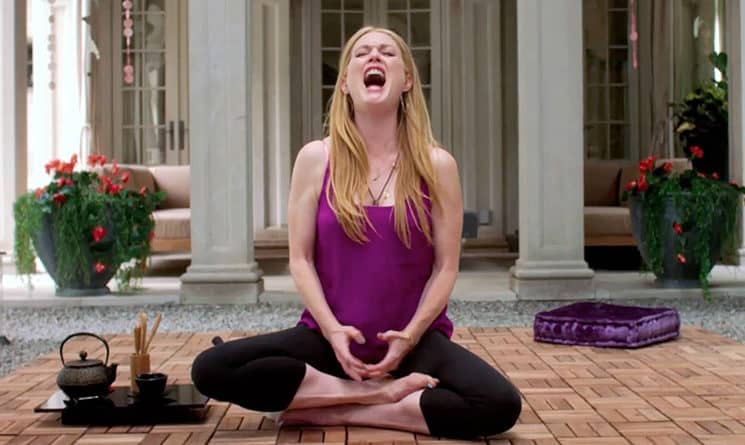It may not be exactly breaking news that Hollywood is caught in its own circle, damned to perennial repetition and doomed forever to walk in its own shadow, drinking its own blood to survive. But director David Cronenberg, taking a position previously played by Dante Alighieri, would like to give you a tour anyway.
After roughly 50 years of probing the greasy placental membranes that conjoin human psychology to biology, Cronenberg is something of an expert guide. With such specialized, focused experience, however, one gets the feeling that he may know his way around a little too well. “Maps to the Stars,” his latest depiction of the calamity of human ambition trapped in the misfortune of meaty flesh, plays out more as an explanation than exploration. He describes two prototypical Hollywood households, bleeding together as they attempt to reconcile a broad range of personal wounds — both physical and emotional — with their compulsions to secure their places in Tinsel-town history.
Cronenberg’s approach to the vanities he describes here is curiously clinical, almost wholly dispassionate. He relates their stories like he’s reading an X-ray. Though his prior amusement with all things disturbing still lingers like an old stain on the sofa, his recent (if 10 years qualifies as recent) swing toward a maturity of style has produced an inescapable glumness. His tone could be described as, well, bored. He seems to have grown tired of exactly the things that made his name, and it shows. Sharing this story of such disconnected, broken personalities from such a cold, matter-of-fact distance has one fair advantage, though: it’s that much more surreal when the ghosts start turning up by the pool.
Wagner’s script actively complains that everything has been done before, then whips out a bag of tropes straight from the dawn of Greek tragedy.
“Maps” is loosely based on the experiences of writer Bruce Wagner, a lifelong Los Angelino known mainly for a brief marriage to Rebecca De Mornay and having previously written “A Nightmare on Elm Street 3.” The screenplay, it bears noting, is almost 20 years old. It’s a little interesting that a tale of attempting to maintain youth in such a fast-moving environment would itself so rapidly grow so direly dated. It’s clearly had some work done over the years, and the stitches really show. The injection of conspicuous, embarrassing references to social media and current AMC shows ultimately serves only to update how out of date the whole thing will be in a year. Maybe in a month. Additionally, the writing, in its reach for provocation, is actually startlingly obtuse. Wagner’s script actively complains that everything has been done before, then whips out a bag of tropes straight from the dawn of Greek tragedy. It laments the emptiness of celebrity even as it name-drops dozens of real-life figures. It would appear to condemn the very system that created it, but remains positively insular in its blame of the fictitious individuals it portrays.
Which brings us to those individuals — bastards, to the last of them. We’ve got a fading actress (Julianne Moore) with the desperate, possibly delusional emotions of a teenager; her quack therapist (John Cusack) and his wife (Olivia Williams), attempting to engineer a dynasty for themselves by shamelessly exploiting their brat son (Evan Bird), a 13-year-old rehab grad stuck somewhere on the spectrum between Macauley Culkin and Justin Bieber, and a mysterious young woman (Mia Wasaikowska) who’s returned from the past covered in burn scars and looking for revenge. Or acceptance. They could be the same thing for her.
But here’s the thing: There’s not one good guy on the call sheet. Beyond being cardboard cutouts of stock Hollywood stereotypes, they’re every one of them antagonists, with nothing but spite, inadequacy, and desperation fueling their graceless tumble into irrelevancy. They have, each in their own way, chosen to engage an industry that literally makes ghosts of living souls, freezing their moments on screens and in tabloids for perpetuity, and then tossing them aside to conclude all alone their tortured march to oblivion. There might be nothing more crazy-making than mortality to someone who’s already been immortalized, but that’s a shoddy excuse for being such terrible company at parties.
Announcing right up front that this parable about life in the Hell of Recycled Ideas is itself composed primarily of recycled material could almost be hailed as a ballsy conceit if it didn’t so quickly and predictably collapse into its own tired, pretentious, recursive feedback loop. With even a passing glance at this map, you’ll see you can find a dozen better spots to visit. Best to just get back on the tour bus and buy a ticket to “Sunset Boulevard.”
“Maps to the Stars” is screening at The Music Hall, 28 Chestnut St., Portsmouth, April 10-16. Visit themusichall.org for showtimes.

